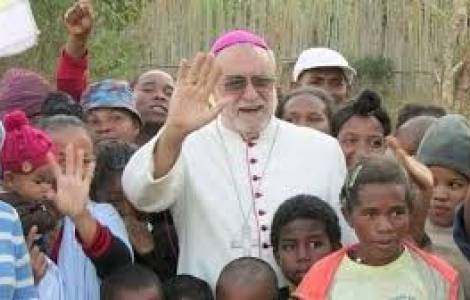
Antananarivo (Agenzia Fides) - "The diocese of Moramanga is a relatively new diocese and the challenges that the Church faces here concern, above all, the creation of new structures and the training of pastoral workers," said Bishop Rosario Saro Vella of Moramanga, Madagascar in an interview with Fides.
The Diocese of Moramanga was founded in 2006.
What is the church situation today?
We still have few diocesan priests, just four, and one deacon. Together with the religious priests, we are a total of 35 priests. Thank God we are a close-knit community that works well together. There are 14 parishes and mission districts. They all have a large territorial extension and numerous mission stations. By mission district we mean a center where a priest or religious are present. Mission stations mean “small churches” that have at least 20 and a maximum of 70 or slightly more believers. In such a large area, not all believers have the opportunity to celebrate Holy Mass. In some areas they can only hold a service once a year.
In such a reality, catechists play a fundamental role...
We have several catechists, some of whom are well trained and have completed at least 10 months of training in our training centers. In these cases we give them the opportunity to distribute communion. Every Sunday all catechists preside over a liturgy of the word and, where possible, the faithful can receive communion. In addition to leading the Sunday Liturgy of the Word, the catechists are involved in the education of children and marriage preparation courses, in baptism preparation and in visiting the sick. This is important because people see catechists as their own people who are highly valued and loved. One thing that I have noticed and that I greatly appreciate is that the faithful preserve the memory of the previous catechists and even remember anecdotes about their lives and personalities. So it is a living and very lively Church.
What is the situation in Madagascar from a social perspective?
If you look at the natural wealth of Madagascar, it should be a prosperous country, a true paradise on earth. Paradoxically, however, it is one of the poorest countries in the world. The reasons for this are diverse. First and foremost there is corruption, which means that nothing works, there is no justice, no health and no education. The situation is dramatic and we, who are close to the population, can see it. Our aid facilities, such as Caritas or the facilities of religious communities, are assaulted every day by crowds of people asking for help with basic needs. Families cannot send their children to school because they lack the things that we Europeans take for granted. The greatest drama occurs when there is a sick person in a family. They come and ask about their rights: "I would like to have a job"; "I would like to give my children the opportunity to be educated"; "I would like to be cured or have the opportunity to provide medical care for my family." The Church does a lot and tries to do more and more, but is unable to meet everyone's needs.
Is there reason for hope?
The situation is truly dramatic, but in this drama there are many bright spots that give hope. First: There are no wars in Madagascar, thank God…. And we do not foresee that there could be a war, because despite the existing social tensions, a peaceful solution is always sought. This is a credit to the Malagasy mentality. Another element of hope is the islanders' great patience and adaptability. Wages are very low and the resources available are minimal, yet the Malagasy people live well and manage to feed their families. And finally, there is great solidarity between people, between families and in the neighborhood. This starts at an early age. A child says: "I have to share the food that my mother gave me with those who don't have it". One of the commitments made in schools, especially during Lent, was to share snacks among students. (L.M.) (Agenzia Fides, 5/4/2024)